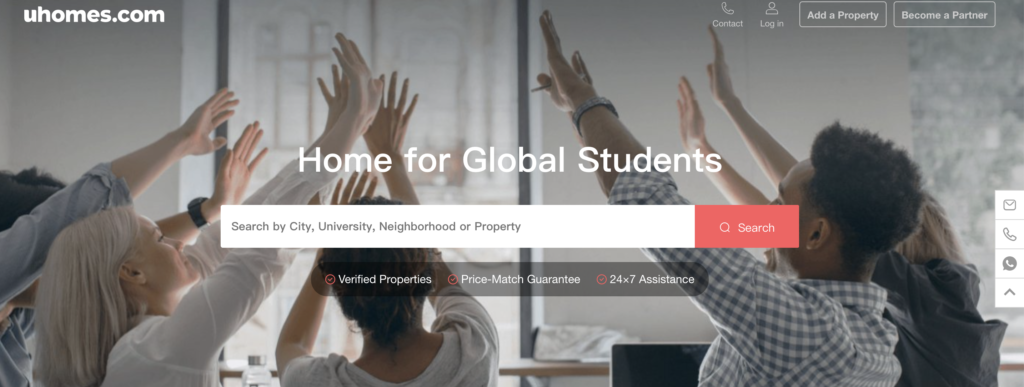Can international students buy a house in usa? Of course they can! In US policy, foreigners are allowed to purchase property within the US. For international students who are also on a non-immigrant type of visa the answer is inevitably yes. In fact, you can buy a house remotely even if you are not in the United States. However, international students with F1 visas cannot work. They must have sufficient funds to pay the full amount. Or they can choose to have a large enough down payment, as well as sufficient proof of paperwork.

Can Students Buy Property on Loan?
Yes. There are many international students are loans to buy houses. It is important to note that international students are usually on F1 visas. And F1 status include the status of F1 and OPT. OPT status is the people already have a job with a stable income. And they are easy to get a loan without any problems. Loan brokers can get a lot of very flexible loan programs, some of which are still not accessible in the market.
F1 visa status of school students, also not must pay the full amount of a one-time payment. Some banks within the Chinese background of the bank (for example: HSBC, Huamei, Cathay) can be oriented to international students loans. This loan does not require proof of U.S. income, is a foreigner can apply this loan method. Only the down payment ratio will be higher, generally at least 40%. Each bank requirements are different. Taking HSBC as an example, they needs customers to open a premium account. The deposit is at least $100,000 in the account, and the storage time needs to be more than sixty days. In fact, the down payment is more relative to the corresponding default risk will be low.
Documents Required for Foreigners Buy Property
The materials required for international students to buy a house in usa are:
- Valid passport and visa (this is a must)
- Prepared proof of funds for the purchase of the house (a certificate of deposit from a domestic bank in English and Chinese)
- Resident identification card
- Personal credit record
- Account number in the local bank in the United States
If the loan also need proof of employment, proof of income from work. In the United States for loans, different banks require different materials needed to be provided, for processing, you need to reconfirm with the bank.
Which is Better: Buy or Rent House?
On Campus Housing
Many U.S. colleges and universities do offer on-campus housing for international students. However, it is sometimes more expensive to live on-campus than to rent off-campus. The University of Southern California has calculated that an average U.S. international student rent. The rent is around $15,000 a year, and spend more than $60,000 for four years of undergraduate study. However, school dormitories have a lot of restrictive rules or less liberal light-out times. Especially during the summer and winter vacations. The dormitories often lack good maintenance and management, and there may even be extreme situations such as water and heat cuts, which may cause inconvenience.
Off Campus Housing
Of course, the price of renting off-campus housing for international students in the U.S. is also very high. For example, if a USC student rents a studio off-campus. The monthly rent will be about $950, and the rent for one year will be $11,400. And the rent expenses for four years will be nearly $45,000 dollars. If you want to rent a house in usa, uhomes is the best choice for you to find a comfortable and cost-effective house in the US. On our website, you can find the house rent in New York, Los Angles, Seattle, and San Fransisco. We offer different room types for you to choose. From Studio to three bedrooms, to meet your different needs.

Buy a House in USA
For international students as a group, many of the answers are that buying a home is more reliable than renting. There are several reasons for this:
First of all, there are many unreliable factors in renting an apartment. For example, the problem of getting along between the foreign student and the landlord. It is likely to cause a lot of unnecessary trouble. Due to the difference in living habits, and the unsatisfactory life is likely to affect the study as well.
Secondly, “using a house to support studies” has become one of the most important ways for foreigners to plan their assets. Buying a house is not only a way to live by yourself, but also a way to rent it to other students. Rising rents can also increase the value of the house. Generally speaking, when each tenant signs a lease, there is an annual increase in the lease. Depending on the area, the increase is usually at 3-5%. Homes that are close to schools are generally not a problem to rent.
The Process of Buy Property in USA
The steps of buy a house in USA as follow:
1. Preparing the down payment
2.Know your credit score
3.Select a buyer’s agent
4.Find a loan company
5.Issue a loan pre-approval letter
6.Select a house
7. Home inspection
8.Home Market Appraisal
9.Third party closing notary
1. Preparing the Down Payment
If you are wonder can foreigners buy property in usa with high home prices and a hot market. It is recommended that you have at least a 20% down payment in hand with your OPT status. The aim is to have the confidence to grab a home. Many international students who have just started working need their parents’ help to finance the down payment.
In addition to direct bank remittance. You can also choose some large international money transfer companies, such as Money Gram and Wester Union. These remittance platforms are more formal and reliable. And the fees are slightly lower than banks, and the arrival time will be faster.
2. Know About Your Credit Score
Credit Score greatly affects the loan amount and interest rate. If you want to pay less for your loan, and buy a more expensive house with less down payment, you need to keep a good record.
The length of your credit history, the number of credit lines, the history of loan repayments, the type of credit, and so on. All have an impact on your credit score. Credit scores are closely related to a person’s life and take time to build up. The most important thing is the FICO score.
Loans are priced in steps, usually 20 points a level. For a Jumbo loan, it’s 760-780 for tier 1. The next tier is every 20 points. Conventional loans are 740 for tier 1. And if you’re above 760, the rate will be a little lower, but not by much per month.
3. Select a Buyer's Agent
In this process, you’ll need to find a Realtor. A Realtor is a member of a real estate association. They have higher standards as well as more resources to search for the most authoritative data and statistics for you to make sure you find the best property for you. They are also responsible for helping you to: Book viewings; Accompany viewings; Negotiate prices; Answer your concerns and questions.

4. Find a Loan Company
Loans in the United States can be obtained from a choice of banks. Loan policies vary from bank to bank, and from state to state. For different status, different capital reserves, suitable loan channels are not the same. Therefore, what kind of loan channel should be chosen, or should be analyzed with the specific situation. To take out a loan you need to provide your passport, job information, income information, and existing savings.
Although not all lenders are able to provide loans to students on OPT in order to control risk. There are still some lenders in the market that can provide loans to students on OPT. In terms of interest rates, OPT loans are basically on par with H1B. Although they will be relatively higher than regular loans. As for how much you can borrow, lenders generally only let you carry up to 45% of your pre-tax salary in monthly payments.
5. Issue a Loan Pre-approval Letter
There are two general types of pre-approval letters:
Pre-approval
Pre-approval is the most preliminary review of your ability to get a loan by a lender, which is also known as pre-qualification. Getting a pre-approval letter means that you have passed the preliminary approval criteria. The validity period of the document is usually 60-90 days. 80% of buyers take this type of approval because it is relatively simple, requires fewer documents and is faster. OPT status application takes a bit longer, but most of the Lender can get it done within 1-3 days.
Underwritten approval letter
Compared with the pre-approval letter, the underwritten approval letter is much more valuable, and the Lender will scrutinize the details including salary, tax return, annual salary, bank account history, etc. It usually takes 3-14 days.
It is recommended that all buyers do the underwritten approval directly before making an offer, as having it means your loan is basically secure. For the seller, seeing the underwritten approval is equal to giving him a piece of mind. The chances of winning under the same offer terms will be greater.
6. Select a House
Once you have selected a house you like. The agent will assist you with a CMA appraisal, after which the buyer decides on an offer amount. When making an Offer, the buyer needs to enclose a deposit check (usually the deposit is about 2-3% of the offer amount). After negotiation between buyer and seller, agreement is reached. Enter into a third party notary public for the closing of the sale.

7. Home Inspection
Once the contract is official, your agent will make an appointment for you to have the home inspected. This process to determine the condition of the home. After the inspection, they will give you a copy of the home inspection report. If the home needs repairs, the buyer and seller can negotiate through the broker who will pay for the repairs.
8. Home Market Appraisal
The lending company will only lend you money if it proves that the value of the house is greater than or equal to the sale price. This is when you need a professional real estate value appraisal report. Usually, buyers are required to pay for a real estate value appraisal. This will be assigned by a lending institution such as a bank.
9. Third Part Closing Notary
Finally, a third-party closing notary (Escrow) company will check the past ownership history of the house. It is to determine if it can be sold and legally transferred to you. You will complete all of the notarized closing procedures at this step. You will then obtain the keys to complete the transfer and apply for utilities.
Costs of Foreigners Buying a House in USA
- The price of the house itself;
- Related fees that must be paid (5%-7% of the price of the house), which include:
| Related Fee | Fee(dollar) |
|---|---|
| Attorney’s fee | $500-$3,000 |
| Appraisal fee (for second-hand houses only) | $200-$500 |
| Home inspection fee | $300-$500 |
| Third party notary fee | $600-$1,200 |
| Title transfer fee | $300-$600 |
| Notary fee | $50-$120 |
| Registration fee | $80-$100 |
| Additional insurance fee | |
| Other Fees |
In addition, international students need to pay taxes to buy a house in the United States. Pay 0.5%-3% property tax per year. It depends on the area where you buy the house, and the US property tax has different percentages according to different states.
Tips for Foreigners Buy Property in USA
- International students buying a home in the U.S. need proof of funds. And due to foreign exchange controls, it is recommended that funds sufficient for a down payment be deposited in a U.S. bank at least a few months in advance. This will make it easier from the viewing of the house to the final step of the closing procedures.
- Always keep in touch with your broker in the pre-buying stage. Mid-stage including the closing, as he is a professional and will give you effective answers to any questions.
- The choice of the area that suits you is made on a case-by-case basis. With easy access to transportation being the most basic requirement.
- There are many real estate brokers in the United States, so be careful to distinguish and identify them.
- The process of buying a home involves some important steps. The inspecting the home, requesting repairs, and reviewing reports on the results of the home. Also include purchasing homeowner’s insurance, purchasing a homeowner’s protection plan, escrowing the property fairly, inspecting the home, registering the information, and handing over the keys. Property taxes must be paid annually within a specified time frame.
FAQ
The property tax rate in the USA varies widely depending on the location. As it is determined by local governments such as counties, cities, and school districts. On average, property tax rates range from about 0.2% to 2% of the property’s assessed value annually. However, in some areas, particularly in states with no income tax, property tax rates may be higher to compensate for the lack of other tax revenue sources. It’s important for individuals to research the specific property tax rates in the area where they are considering buying property.
In the United States, the most common document that serves as evidence of property ownership is the deed. The deed is a legal document that transfers ownership of real property from one party to another. It typically includes the names of the current and previous owners. A legal description of the property, and the date of the transfer. Once a deed is recorded with the appropriate government office. It becomes a public record and serves as proof of ownership.
For foreigners buying property in the US, rules generally involve visa status, FIRPTA tax obligations, potential financing challenges, ownership restrictions, and the importance of legal assistance.
Unlocking the Ultimate Guide to House Rent in the USA
For international students, there are many things to pay attention to house…








